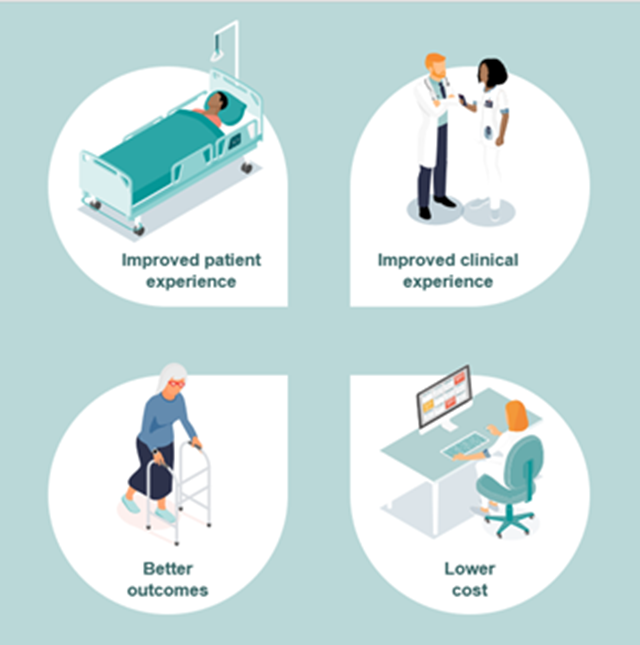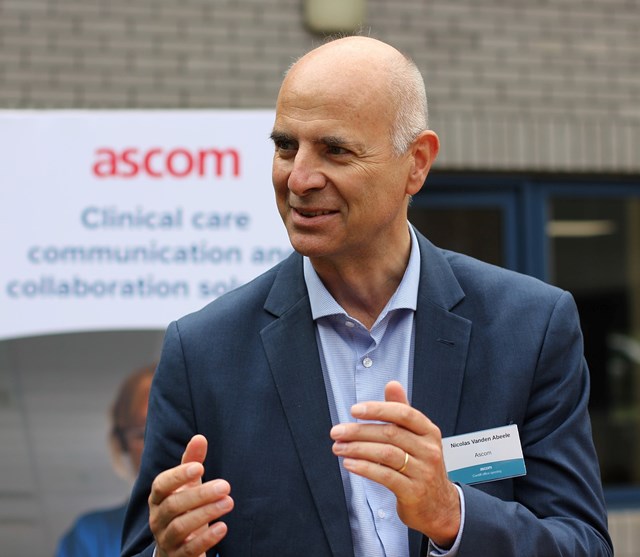Country Selector: United Kingdom
Ascom recently unveiled its expanded Ascom Healthcare Platform (AHP), a suite of communication and collaboration solutions for hospitals and other large healthcare facilities. Ascom CEO, Nicolas Vanden Abeele, discusses how the AHP can help hospital managers overcome the cost challenges they face - while still contributing to better care quality, plus greater patient and employee satisfaction.

Nicolas Vanden Abeele is clear on the impact and value of the Ascom Healthcare Platform: “The AHP is, quite simply, an important milestone in our healthcare strategy. But crucially, it is a milestone in clinical communication and collaboration to help hospitals cope with their daily challenges in terms of care delivery and better patient outcomes.”
Better care at a lower cost
These daily challenges for hospital management can often be summed up as a constant - and stressful - balancing of costs while maintaining and improving patient care quality. Achieving better patient outcomes and experiences while getting more from existing resources and infrastructure is hard enough. It becomes even trickier against the backdrop of ageing populations needing more care and the impact of pandemics (Covid-19 being the best-known example) that has put healthcare systems under more strain and caused shifts in clinical workflows.

Increasingly, there has also been a greater understanding of the importance of clinicians and their wellbeing towards achieving a hospital’s care and cost objectives. There has been a focus on improved care, better health and lower costs - but a key factor that hospitals are now considering is improving the work life of those who deliver care. This can lead to productivity gains for both cost and care improvements but it also helps prevent burnout and dissatisfaction, so hospitals can retain and recruit clinical staff who are often in short supply, especially across the NHS.

It’s also about solutions that help clinicians make vital decisions on the move, liberating clinical data from silos and stationary access points. For example, one AHP solution makes it easy to send clinical data and alerts securely, reliably and in near real-time to clinicians’ built-for-healthcare smartphones. Using the same device, clinicians can then communicate with patients and colleagues. No matter their location in a hospital, clinicians can coordinate responses to alarm notifications and requests. They can access and upload to Electronic Patient Records, view waveforms, send photos, monitor isolated patients’ vitals and more - all while on the go.
“Advanced mobility solutions can help reduce costs while simultaneously improving care, but it is essential to have the right implementation and support. That’s why we have a sizeable expert team of Clinical Consultants, many of them registered nurses. They are there to ensure that each implemented solution is optimised for clinicians and their patients.” As for post-implementation support, Nicolas points to Ascom’s 24/7 customer support and regional offices, including in the UK. “Comprehensive post-implementation support is essential for our customers to maximise their investment - by ensuring the best-in-class uptime and performance.”
Getting the most out of existing resources
Although the AHP solutions perform a wide range of functions, each is characterised by open architecture and interoperability. This means the solutions easily work with virtually every approved healthcare IT system and medical device on the market. “We want hospitals to get the most out of what they already have,” says Nicolas. “That’s one reason why we have our own extensive driver-design team. And why we work closely with so many medical device manufacturers to integrate their systems and drivers into our AHP solutions.”
Patients and their outcomes in focus
In addition to Ascom’s technical innovation, Nicolas is keen to stress the company’s commitment to patient-centric healthcare and clinical outcomes. “Improving patient outcomes are at the centre of our hospital solutions. And we all know that making work easier for frontline clinicians can improve satisfaction for both clinicians and their patients.”
One area where the AHP achieves this in some regions is by creating quieter working environments. Integrated communication with devices like infusion pumps or ventilators enables them to operate in silent mode while still delivering relevant alerts and data. As well as filtered alerts that go directly to clinicians’ handsets instead of being broadcasted to everyone as audible alerts and/or flashing corridor lights. “These are useful examples,” says Nicolas, “as they illustrate how an AHP solution can benefit patients, staff and hospital management. Quieter wards support faster healing and recovery. They can help reduce sick leave and stress among staff. And both, of course, translate into major cost savings. And that, in today’s healthcare environment, is quite an achievement.”
To find out more about how the Ascom Healthcare Platform can benefit clinicians and patients across your hospital, click here.
We offer free in-person consultations to demonstrate how the AHP can work within the unique demands of your hospital – contact us for more information.
